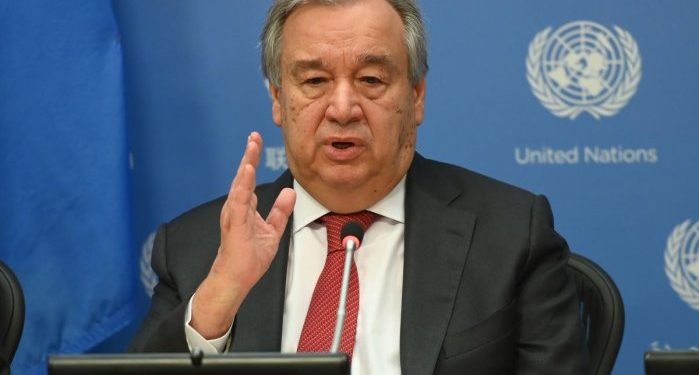United Nations: The WHO is “irreplaceable” and needs enhanced resources especially to provide support to the developing countries facing the “devastating” impact of COVID-19, UN chief Antonio Guterres said Monday, amid criticism of the global health agency’s handling of the pandemic.
The Secretary-General said the entire United Nations family “stands” with thousands of its colleagues at the World Health Organization (WHO) who are working around the world to support the member states in saving lives and protecting the vulnerable, with guidance, training and essential testing, treatment and protective equipment.
Guterres also voiced concern over the “devastating” impact the outbreak will have as it spreads across the developing nations.
“The WHO is irreplaceable. It needs enhanced resources, particularly to provide support to developing countries, which must be our greatest concern. We are as strong as the weakest health systems,” Guterres said while addressing a virtual event of the opening of the 73rd World Health Assembly, which supervises the WHO.
The US has strongly criticised the WHO for its handling of the pandemic, with President Donald Trump halting funding to the WHO. Trump had launched a scathing attack on the Geneva-based WHO, saying it has been “China-centric” and has been “wrong” on a lot of things about the virus.
Guterres reiterated his comments made last month following Trump’s attack and said there will be a time, once the pandemic has been controlled, to look back fully to understand how such a disease emerged and spread its devastation so quickly across the globe, and how all those involved reacted to the crisis.
The UN Chief emphasised that “now is not that time” and now is the time for unity, for the international community to work together in solidarity to stop this virus and its shattering consequences.”
“We cannot contemplate a future of fear and insecurity. Either we get through this pandemic together, or we fail. Either we stand together, or we fall apart,” he said.
The COVID-19 pandemic has ravaged all countries in the world, bringing massive health and economic devastation. Globally, 4.7 million people have been infected by the virus and over 315,000 have died.
There are more than 1.4 million confirmed coronavirus cases in the US and nearly 90,000 people have died, the highest in the world.
Guterres voiced concern over the lack of unity from the international community in dealing with the pandemic, saying many countries have ignored the recommendations of the WHO in controlling the spread of the virus.
“We have seen some solidarity, but very little unity, in our response to COVID-19. Different countries have followed different, sometimes contradictory, strategies and we are all paying a heavy price,” he said, adding that this has led the virus to spread across the world and is “now moving into the global South, where its impact may be even more devastating, and we are risking further spikes and waves.”
“Protecting the developing world is not a matter of charity or generosity but a question of enlightened self-interest. The global North cannot defeat COVID-19 unless the global South defeats it at the same time,” Guterres said.
He stressed that defeating the pandemic will require massive multilateral efforts and expressed hope that the search for a vaccine can be a starting point for this global cooperation.
He urged the G20 nations to consider the urgent launch of a large-scale, coordinated and comprehensive stimulus package amounting to a double-digit percentage of global GDP.
“While developed countries can do this by themselves, we must massively increase the resources available to the developing world,” he said.
Guterres also stressed that the recovery from the COVID-19 crisis must lead to more equal, inclusive and sustainable economies and societies that are stronger and more resilient.
The pandemic is a tragedy but it is also an opportunity to address the climate crisis and inequality of all kinds, including the yawning gaps in social protection systems.
“Instead of going back to systems that were unsustainable, we need to make a leap into a future of clean energy, inclusivity and equality, and stronger social safety nets, including universal health coverage,” all requiring massive multilateral effort.
PTI






































